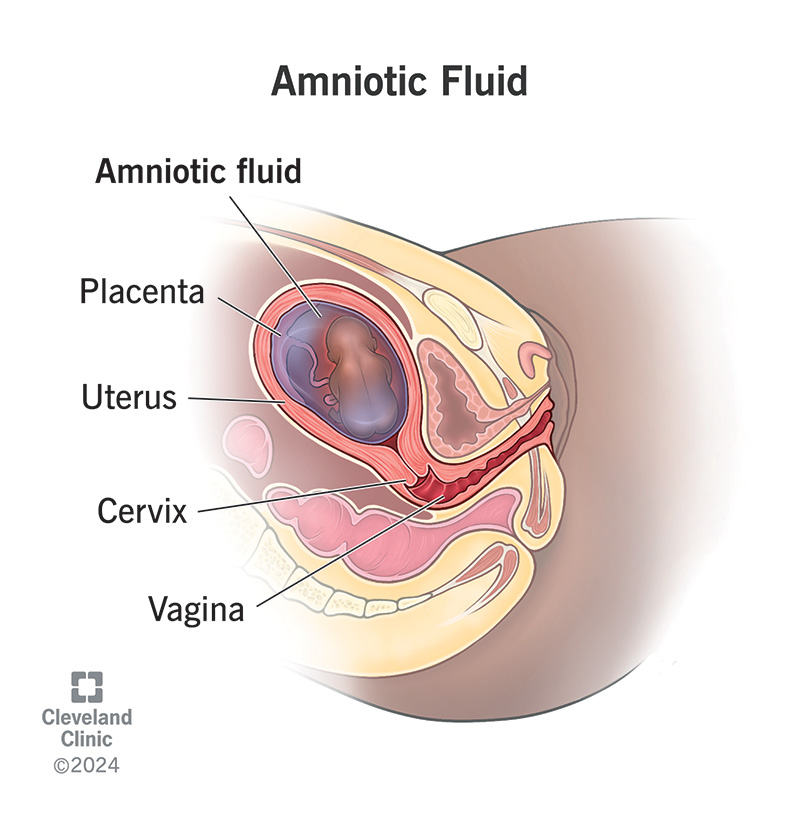Amniotic fluid cushions and protects the fetus during pregnancy. It’s clear or light yellow and odorless. A fetus practices swallowing and breathing by drinking amniotic fluid. Too much or too little amniotic fluid may cause your healthcare provider to monitor your pregnancy more closely.
Advertisement
Cleveland Clinic is a non-profit academic medical center. Advertising on our site helps support our mission. We do not endorse non-Cleveland Clinic products or services. Policy

Image content: This image is available to view online.
View image online (https://my.clevelandclinic.org/-/scassets/images/org/health/articles/23310-amniotic-fluid)
Amniotic fluid is a water-like substance that surrounds and protects a fetus during pregnancy. It plays an important role in fetal development because it helps develop a fetus’s muscles, lungs and digestive system. It also acts as a cushion, protecting them from impact (like a shock absorber). Amniotic fluid contains nutrients, hormones, antibodies and other fluids that the fetus swallows and pees out. While it sounds unpleasant, it’s healthy for the fetus to swallow and breathe in amniotic fluid.
Advertisement
Cleveland Clinic is a non-profit academic medical center. Advertising on our site helps support our mission. We do not endorse non-Cleveland Clinic products or services. Policy
Having too little or too much amniotic fluid could cause problems for a pregnant woman or the fetus. For this reason, pregnancy care providers have ways to monitor how much amniotic fluid you have. Samples of amniotic fluid can check the fetus for genetic conditions (amniocentesis).
Amniotic fluid is important for fetal growth and development. It helps prepare the fetus for the outside world. Here’s what it does:
Amniotic fluid is mostly water (from your body) for the first half of pregnancy. The fetus’s pee makes up most of the amniotic fluid after about 20 weeks of pregnancy. This is because, like adults, the fetus will swallow liquid and pee it out. The rest of the fluid contains hormones, lipids, carbohydrates, antibodies and other nutrients.
Advertisement
Amniotic fluid is inside the amniotic sac. Picture a balloon filled with water. The amniotic fluid is the water, and the balloon is the amniotic sac. When the sac (or balloon) opens, the fluid (or water) leaks or gushes out.
Amniotic fluid is mostly clear but can be a pale yellow like the color of straw. Amniotic fluid that’s tinted brown or green means the fetus has passed meconium (their first poop). Meconium in amniotic fluid can cause complications if the fetus breathes it in.
Amniotic fluid should be odorless. Contact your healthcare provider if you notice a foul smell as it could be meconium-stained or mean there’s an infection.
It’s common to leak pee when you're pregnant, so some women have difficulty distinguishing amniotic fluid from pee. Inspecting your underwear for smells or color can help you determine what it is. Pee has a unique smell and may be easier to control than amniotic fluid.
It depends on how far you are in your pregnancy. Your amniotic fluid levels peak at 34 to 36 weeks and then slowly decrease as you reach your due date (40 weeks). At its peak, there’s a little less than 1 liter (about 4 cups or 1 quart) of amniotic fluid.
Your pregnancy care provider checks for signs that your amniotic fluid is healthy and that you have enough of it. Some of the conditions that affect amniotic fluid are:
Your pregnancy care provider can measure the amount of amniotic fluid you have in a few different ways. The easiest way to measure it is through a prenatal ultrasound. But since you won’t receive ultrasounds every visit, your provider will use a measurement called fundal height to estimate if you have enough amniotic fluid.
Advertisement
No one is entirely sure if drinking more water can increase amniotic fluid. Some healthcare providers will recommend increasing your water intake if your amniotic fluid is low. There’s no harm in drinking more water during pregnancy but talk to your provider first to see what they recommend.
A fetus needs some amniotic fluid in the uterus to survive. The exact amount of amniotic fluid it needs depends on how many weeks pregnant you are and other factors.
Amniotic fluid is probably something you don’t think much about. But it plays an important role in protecting a fetus during pregnancy. Some pregnant women have too much or too little amniotic fluid, or their fluid becomes infected. Your healthcare provider may monitor you more closely or perform additional ultrasounds if this happens to you. If you’re concerned about your pregnancy or experience fluid leaking from your vagina, don’t hesitate to talk to your pregnancy care provider.
Advertisement
Learn more about the Health Library and our editorial process.
Cleveland Clinic's health articles are based on evidence-backed information and review by medical professionals to ensure accuracy, reliability, and up-to-date clinical standards.
Cleveland Clinic's health articles are based on evidence-backed information and review by medical professionals to ensure accuracy, reliability, and up-to-date clinical standards.
Trying to choose where to give birth? Learn why Cleveland Clinic is the best choice to help you through each step of the labor and delivery process.
